INTRODUCTION
Whenever storage related products make their way to our lab i always look back to the days when we used to carry our work around in floppy disks (sometimes just one) and the hard disk drives used in our PCs were but a few megabytes in capacity. Who would had imagined back then that less than 30 years later our storage capacity requirements would had skyrocketed to entirely new levels that even several TBs would not be able to cover (for example just my personal backups are over 50TB in size and I know people who have over 100TB in backups)? The really strange thing however is that even though manufacturers like Seagate, WD, HGST and Toshiba release larger capacity HDDs all the time our needs increase with them so in the end we're always just one step ahead. Still we can only use what's available and with 8TB hard disk drive models gaining popularity over their 6TB cousins today we thought it would be nice to test Seagate's 3.5" flagship model the Enterprise Capacity 3.5 HDD v5.
Founded in 1979, Seagate is the leading provider of hard drives and storage solutions. From the videos, music and documents we share with friends and family on social networks, to servers that form the backbone of enterprise data centers and cloud-based computing, to desktop and notebook computers that fuel our personal productivity, Seagate products help more people store, share and protect their valuable digital content. Seagate offers the industry’s broadest portfolio of hard disk drives, solid-state drives and solid-state hybrid drives. In addition, the company offers an extensive line of retail storage products for consumers and small businesses, along with data-recovery services for any brand of hard drive and digital media type. Seagate employs more than 50,000 people around the world.
The Enterprise Capacity 3.5 HDD v5 8TB model is currently available in SATA 6Gb/s and SAS 12Gb/s variants (a self-encrypting drive/SED is also available) and uses a total of 6 platters (1.33TB per platter) that spin at 7200RPM and a total of 12 heads. The drive also features 256MB of DRAM cache (twice as much as the previous V4 line), a dual-processor (LSI/Seagate TTB71001VD), PMR (perpendicular magnetic recording), RAID Rebuild (PDF), advanced write caching (AWC - 2M Internal NOR Flash), power loss protection (for the cache) and PowerChoice along with PowerBalance (power save features). Seagate covers the Enterprise Capacity 3.5 HDD v5 with a 5 year warranty and gives it an MTBF (Meantime Between Failures) of 2 million hours with an endurance/workload rate of 550TB/year. The Enterprise Capacity line (former Constellation ES) by Seagate has always been about quality and performance so let's see just how good the latest v5 version is compared to all its predecessors and more.
SPECIFICATIONS AND FEATURES
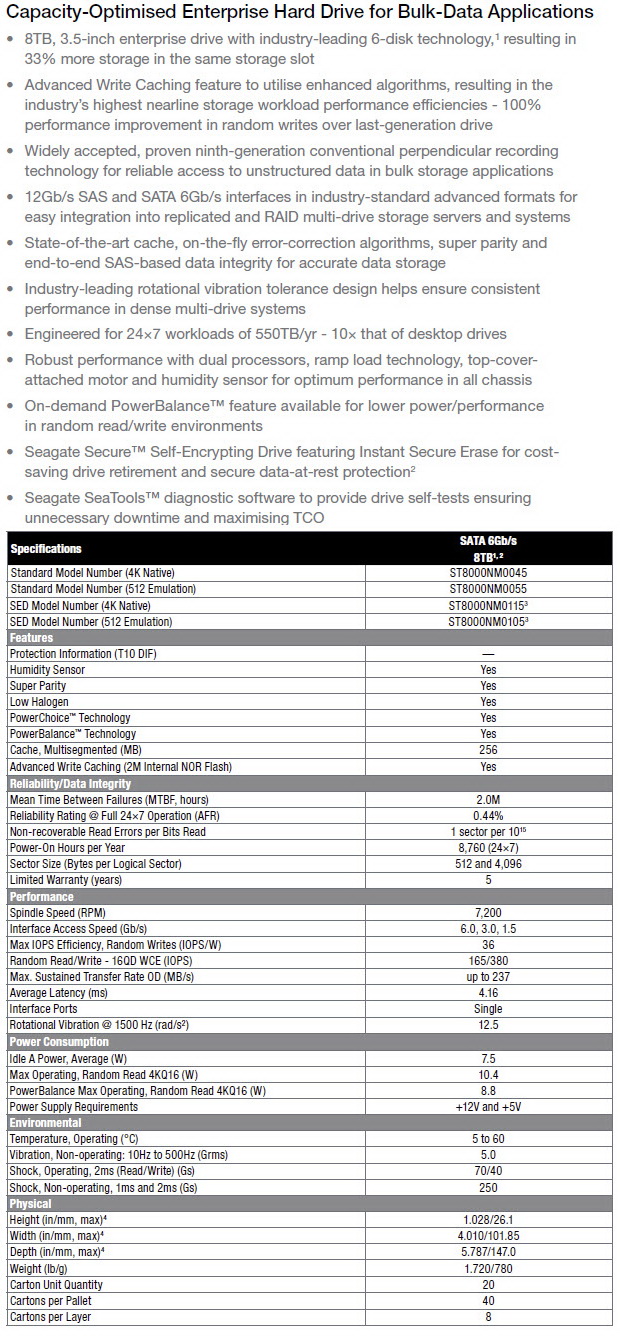
THE ENTERPRISE CAPACITY 3.5 HDD V5 8TB
Typically we received our sample inside a clear plastic package so nothing new to see here.
Nothing new in terms of design compared to most HDDs we've tested from Seagate to date (not that design pays any role).
The very large sticker placed at the top of the drive contains useful bits of information such as barcodes, serial number, model number, part number, factory rollout date (November 29th 2015), country of manufacture, electrical requirements, connectivity type, firmware number and several certification and warning logos.
Once again all of the components (including the controller, sensors and cache modules) are placed on the interior of the PCB and as you can see the enclosure/housing is the same we've seen quite a few times in the past with Seagate drives.
At the rear we see the usual SATA power and data connectors right next to 4 pins (probably used for firmware updating).
Since Seagate send over two Enterprise Capacity 3.5 HDD V5 8TB drives we will also be running RAID0 tests using our LSI/AVAGO MegaRAID 9271-8i card (we also got a 2nd Enterprise NAS HDD 8TB to perform RAID0 tests so next time our charts will be updated with that as well).
TEST BED
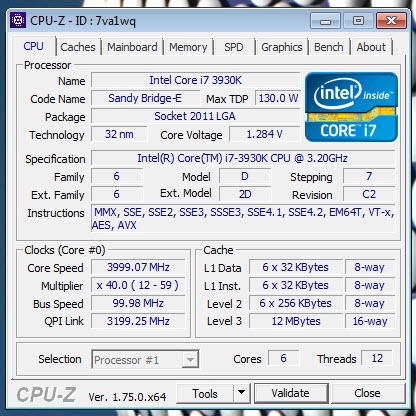

TESTING METHODOLOGY
Thoroughly testing hard disk drives may require time and patience but that's just about it. Of course that doesn't mean that one must take it lightly, at least not when people base their decision on your results. True some choose to only use 2 or 3 benchmarking suits in order to measure the performance of a drive or drives since quite honestly most benchmarking suites do tend to agree with each other (so it's not really wrong) but we always like to take things a step further not because we have to but because we want to be almost 100% certain of the results we get and post in our charts.
So in this kind of reviews we will use a total of 7 different benchmarking suites in an effort to bring you the most accurate results across the board. Now the only reason why i say effort is because real-world usage is not always on par with what results one gets by running several benchmarks on a drive and that's mainly because there are many variables at work from ambient temperatures to hardware configurations and even firmware versions. The benchmarking applications we use are the AIDA64 suite (former Everest Pro), HD Tune Professional, HD Tach RW, ATTO, Sisoftware Sandra Pro, Crystal Disk Mark 64bit and the PCMARK 7 (secondary storage suite). These benchmarking tools are the best in what they do and as you will also see later on their results more or less agree. Each test is performed a total of 6 times and then the average is recorded into the charts. Temperatures are recorded using Hard Disk Sentinel and after 45 minutes of continuous testing in a 23 degrees Celsius temperature controlled room. Finally we also use an ExTech HD600 dBA meter on each of the drives (5cm away) in order to accurately record their noise levels (during access), although if you don't turn off all system fans when doing so it's quite possible that you will never even hear the drive. The operating system as usual is a fresh installation of Microsoft Windows 7 Ultimate Service Pack 1 with every update installed up until the 25th of March 2016.
TEST RESULTS - AIDA64 / ATTO
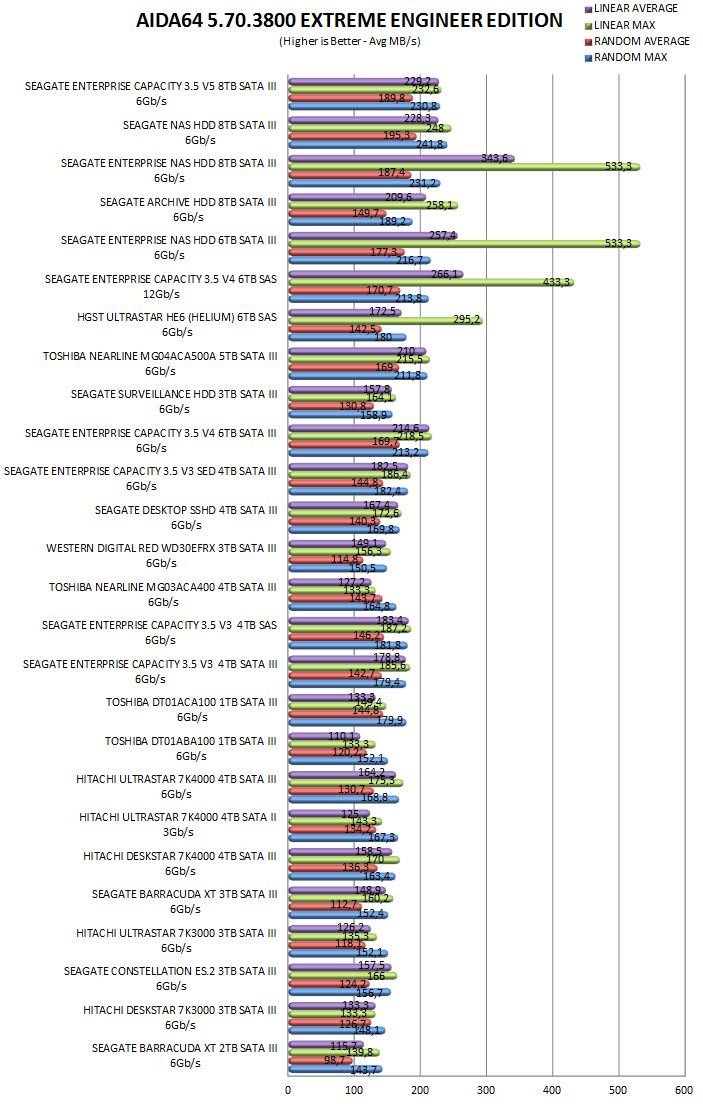

TEST RESULTS - HD TACH RW / HD TUNE PRO
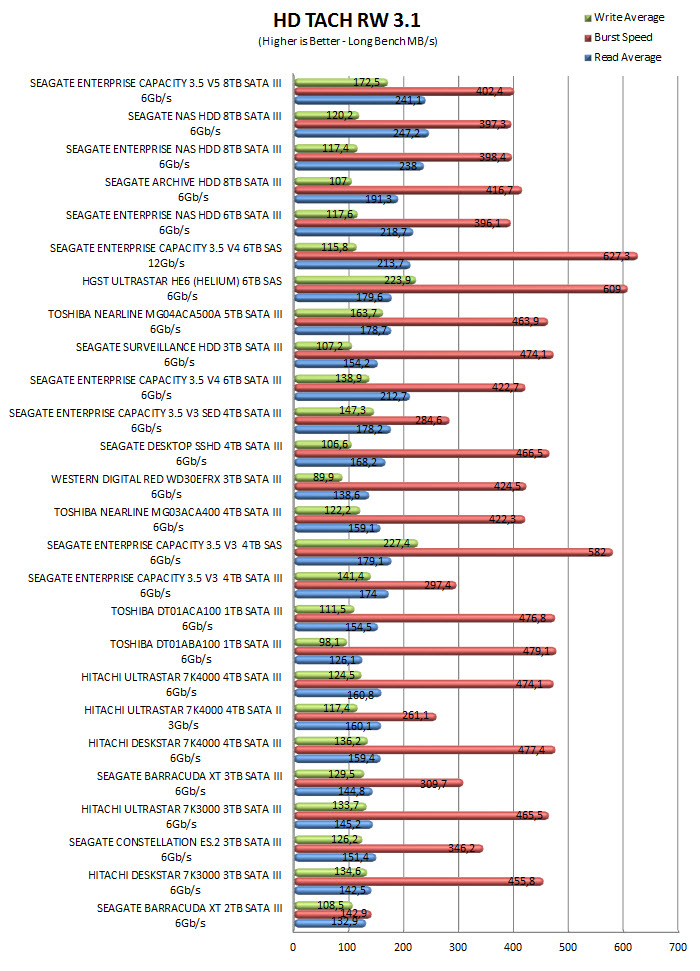
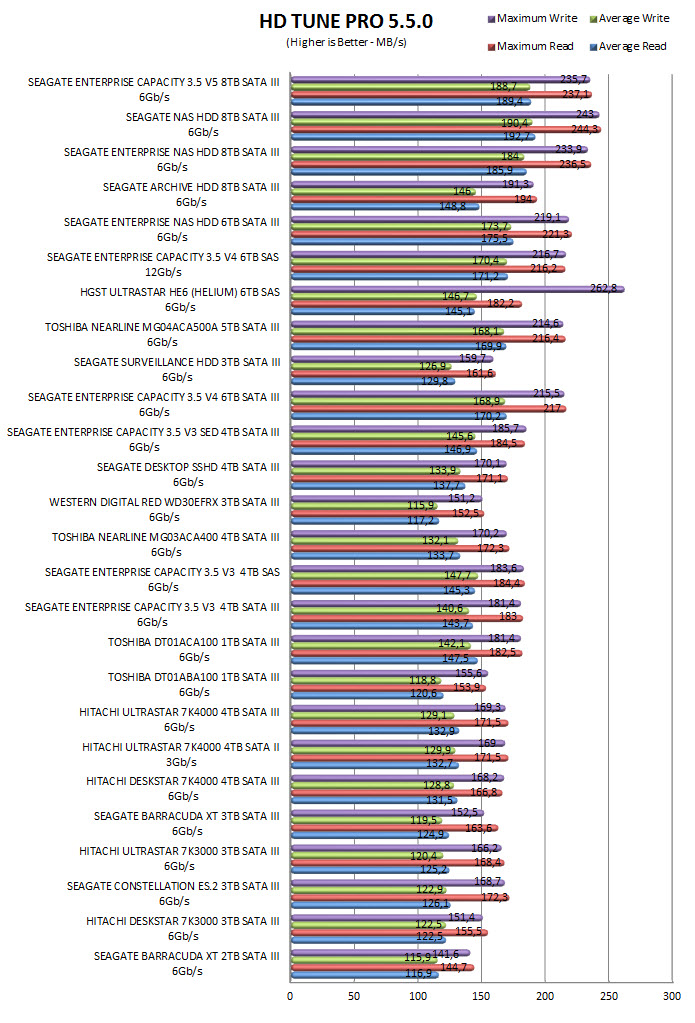
TEST RESULTS - SISOFTWARE SANDRA PRO / CRYSTAL DISK MARK X64
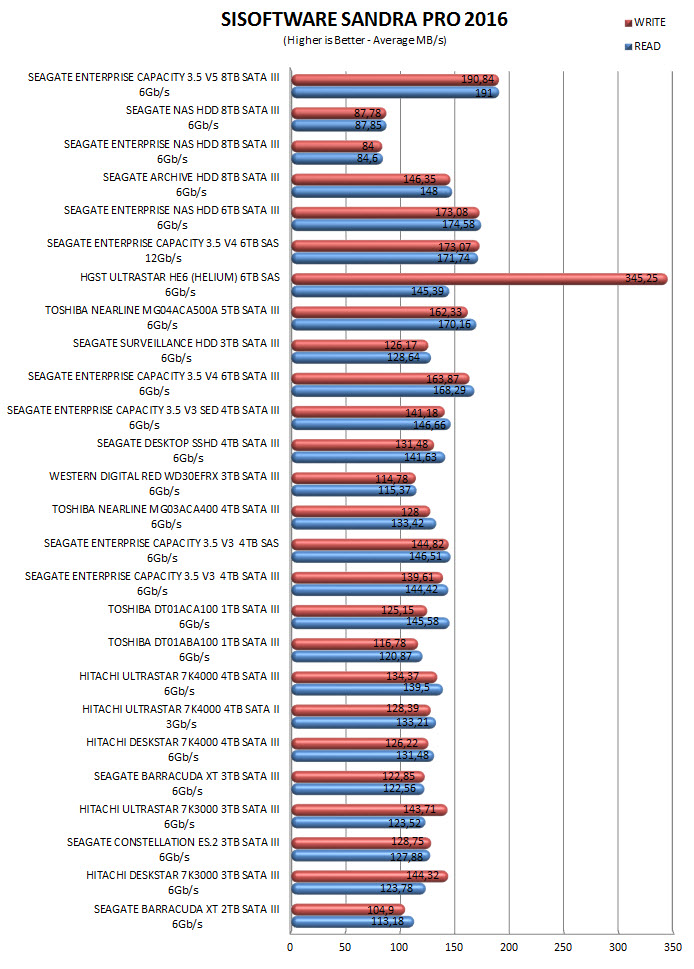

TEST RESULTS – PCMARK 7 / TEMPERATURES / NOISE LEVELS
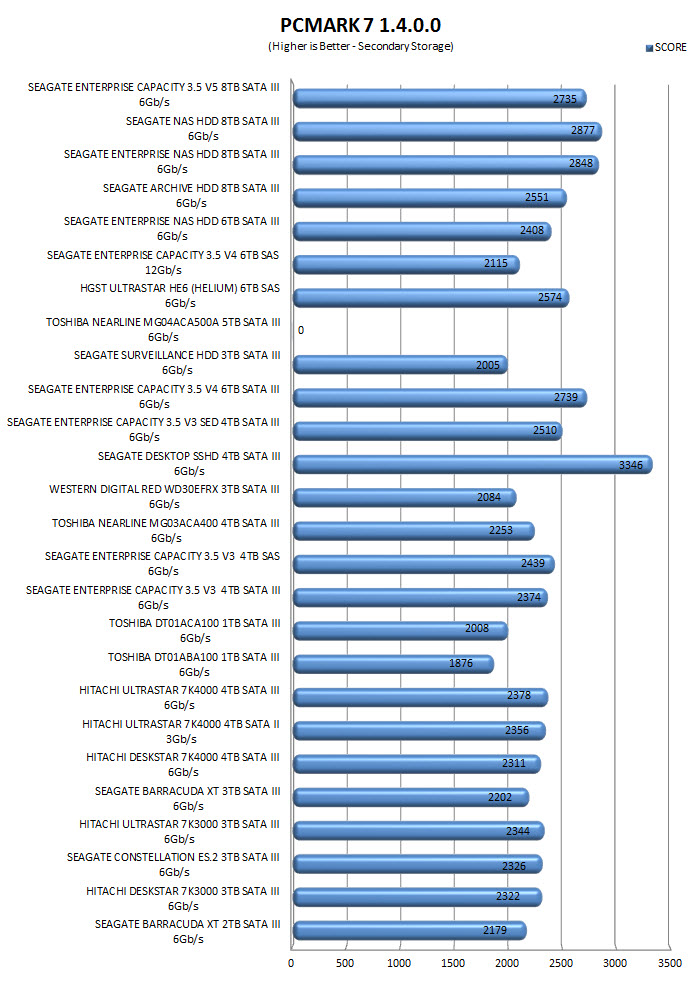
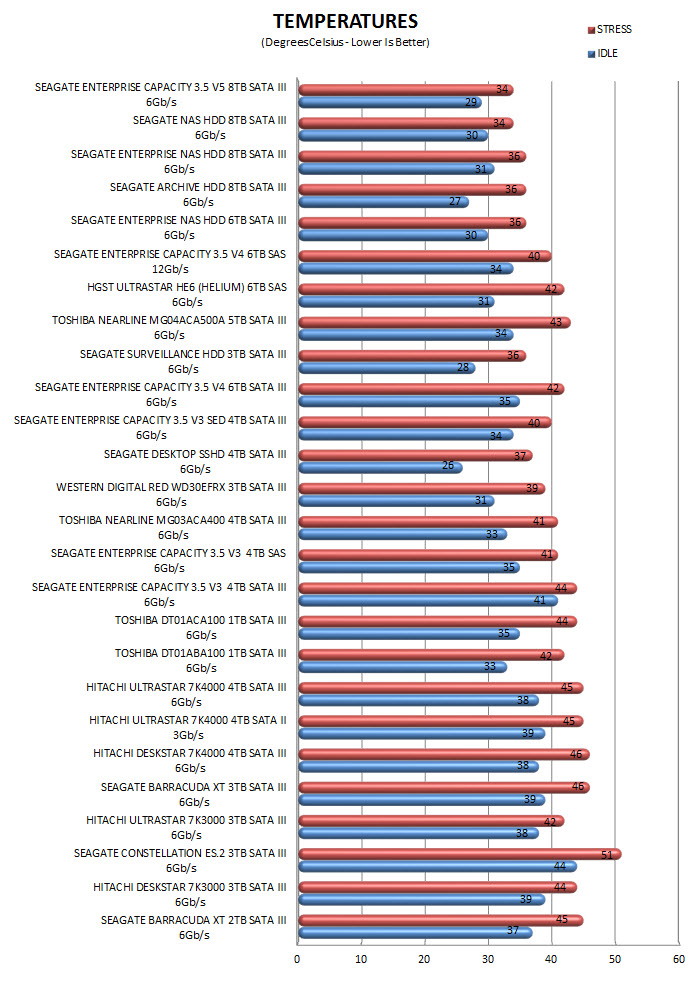
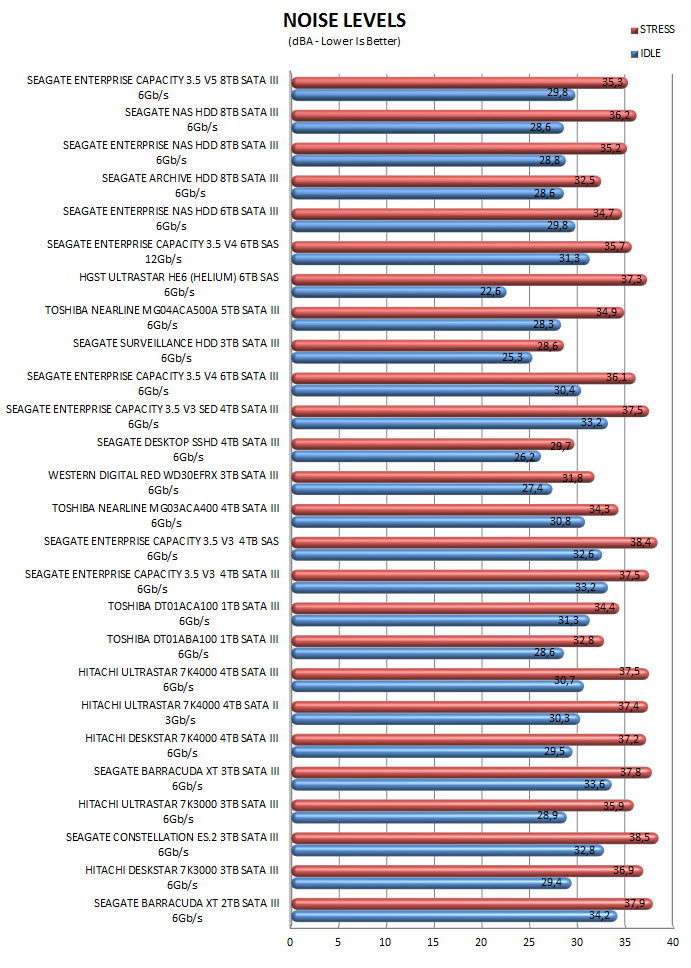
TEST RESULTS - RAID0 PART 1
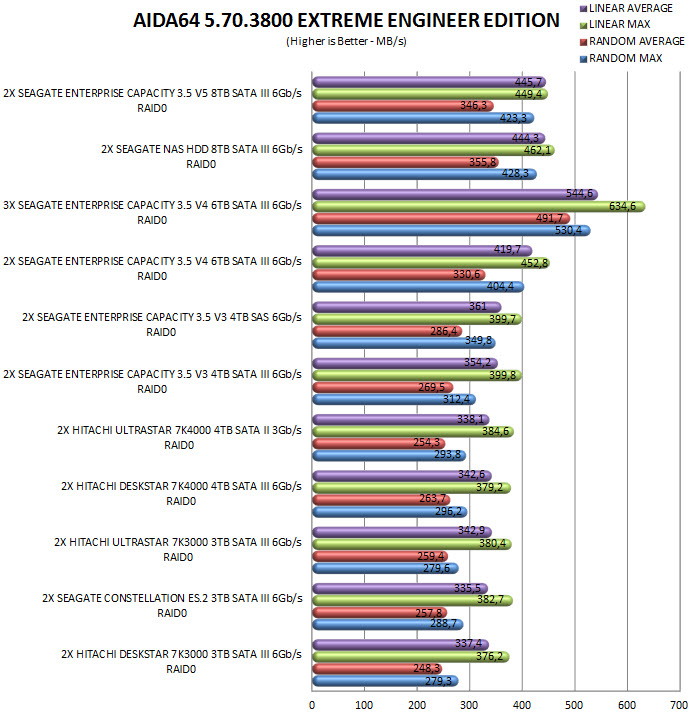
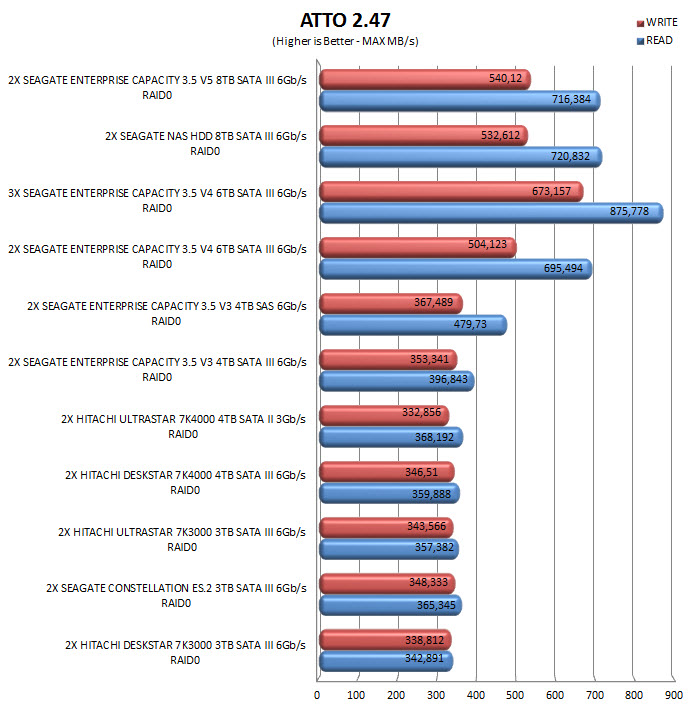
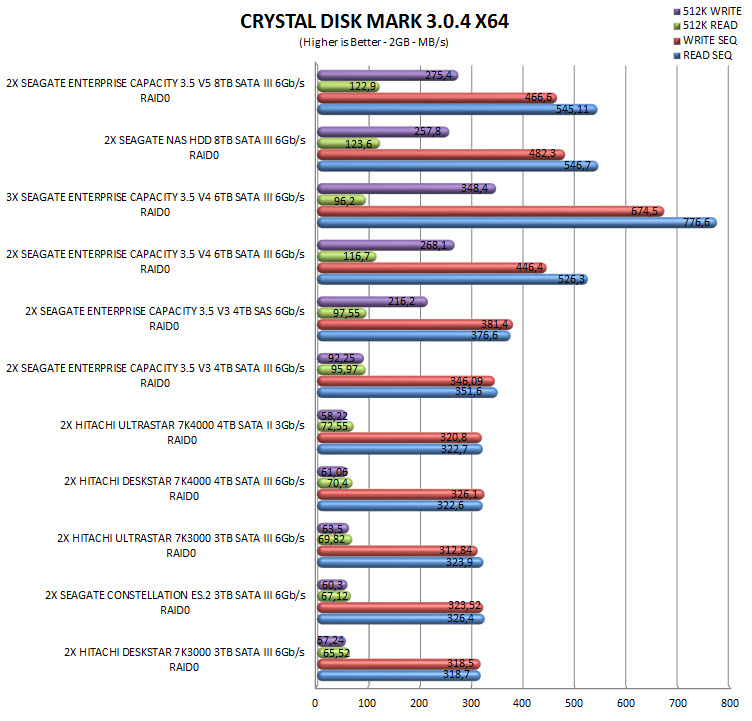
TEST RESULTS - RAID0 PART 2
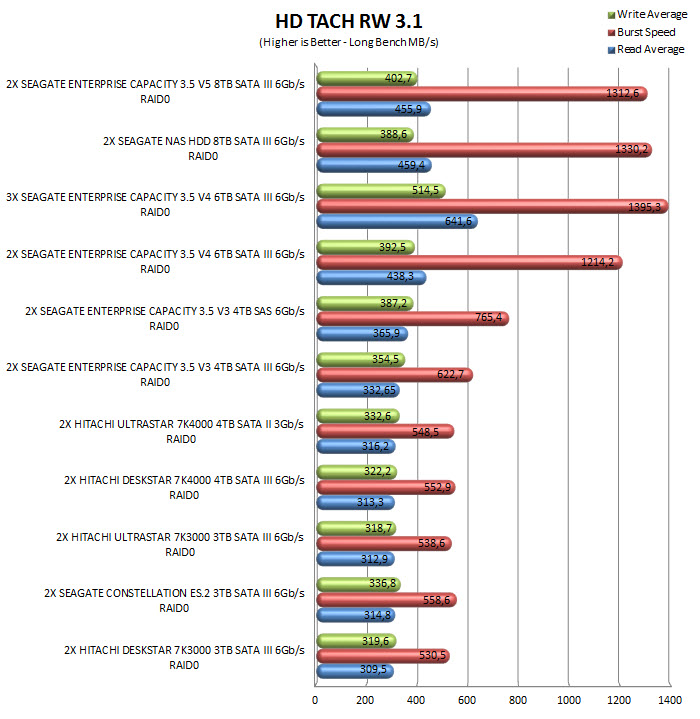
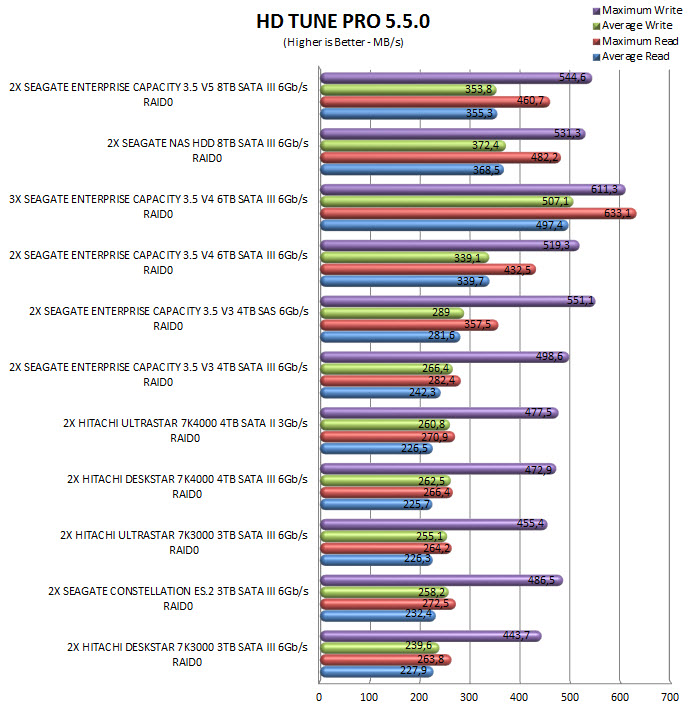
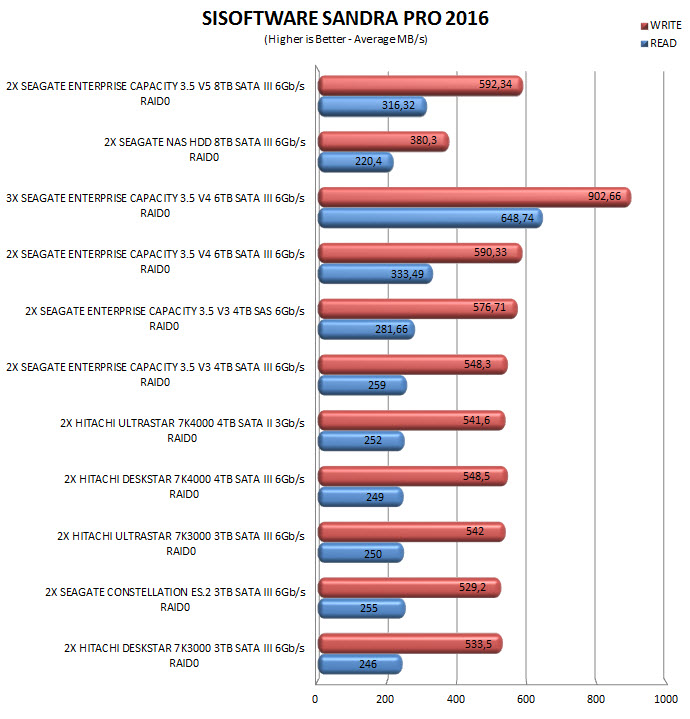
CONCLUSION
Ever since I started testing HDDs from Seagate’s Enterprise line several years ago I’ve yet to be disappointed not only in terms of performance (which you can all see is beyond comparison to most HDDs out there) but also in terms of durability. Now many of you know how i support transparency in everything so I have to admit that we’ve had a couple of Constellation ES.2 drives fail on us after roughly 4 and 1/2 years of “mostly” continuous 24/7 use but if drives (and electronics devices in general) were guaranteed to last at least as long as their warranty periods then what need would we have for those warranties in the first place? The reason I’m even mentioning this I guess is because some people feel that when they buy an HDD it should last for as long as they deem acceptable and in a perfect world I’d agree with them (it’s not a perfect world now is it?). One thing’s for certain however just by looking at our charts, if you need the highest performance drive (overall) with the highest durability the Enterprise Capacity 3.5 HDD v5 8TB by Seagate should be at the top of your to buy list.
Enterprise class HDDs are not cheap and that’s something we’ve seen time and again not only while testing 3.5” models but also 2.5” ones. So the current price tag of USD372.49 inside the USA (Amazon.com) and 505Euros inside the EU (Amazon.co.uk) attached to the Enterprise Capacity 3.5 HDD v5 8TB (ST8000NM0055) is what most people reading these lines would call affordable. Still leaving out its upcoming 10TB variant this is the top of the line HDD model by Seagate both in terms of performance and durability and that’s why it gets our Platinum Award.

PROS
- Enterprise Class Quality
- 2 Million Hours MTBF (Mean Time Between Failures)
- Top Of The Charts Performance
- 256MB Cache
- 8TB's Capacity
- RAID Rebuilt / Advanced Write Caching / PowerChoice / PowerBalance Technologies
- Temperatures/Noise Levels
- 5 Years Warranty
CONS
- Price (For Some)

 O-Sense
O-Sense





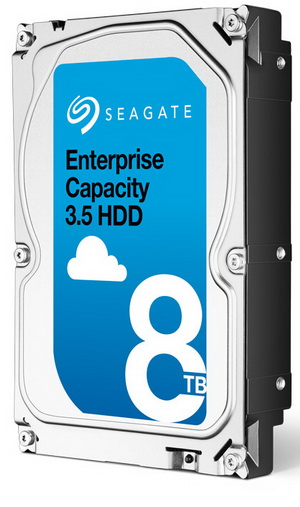
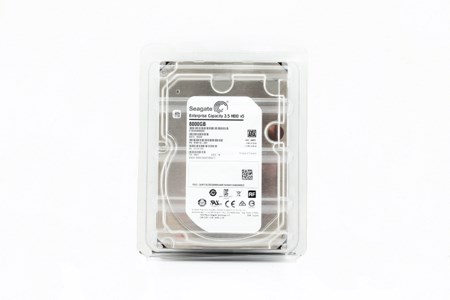
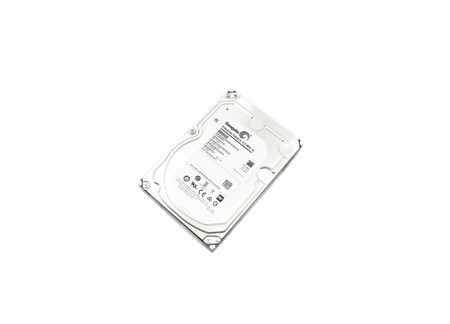
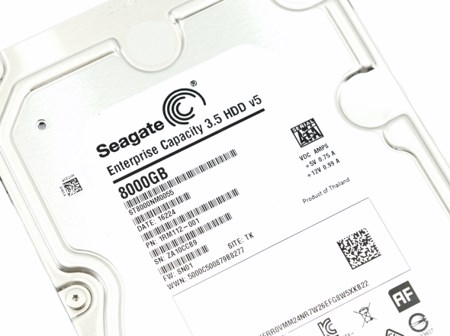
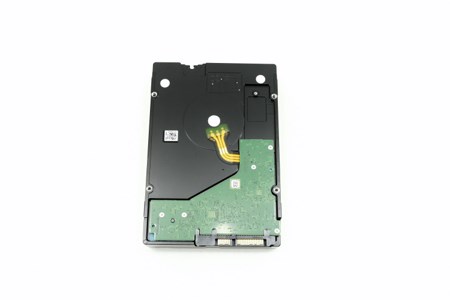
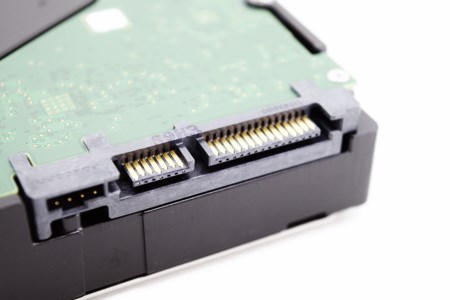
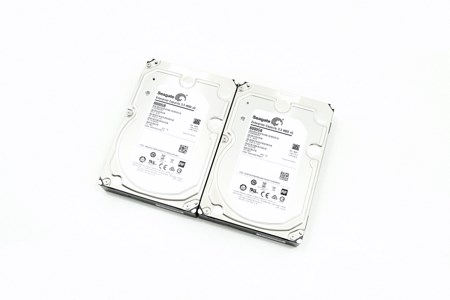
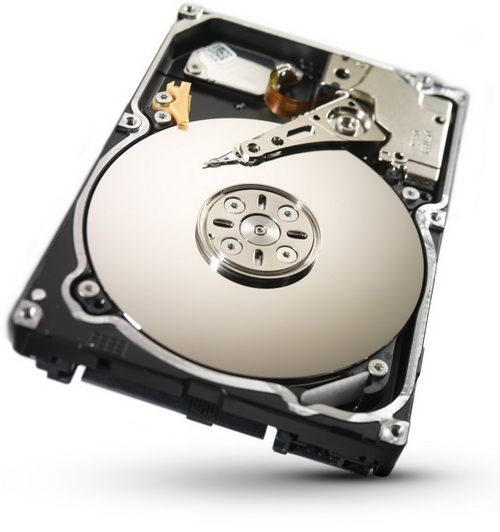


.png)

